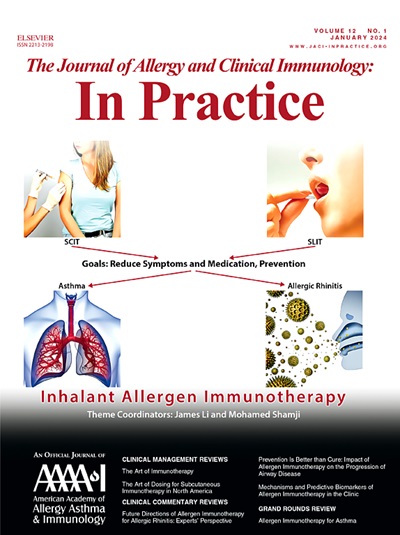Patient-Reported Outcome Measures in Chronic Spontaneous Urticaria, Angioedema, and Atopic Dermatitis
IF 8.2
1区 医学
Q1 ALLERGY
Journal of Allergy and Clinical Immunology-In Practice
Pub Date : 2024-10-01
DOI:10.1016/j.jaip.2024.08.021
引用次数: 0
Abstract
Reducing the burden of disease for patients and families requires being able to measure health status changes related to disease severity, control, and response to treatment over time. Patient-reported outcomes are patient perceptions of their health status. Such perceptions are critical to decision making. Some patient-reported outcome measures (PROMs) are extensive and often intended to be used only for detailed research assessments. Many PROMs, however, form critical components of valid, reliable, and responsive assessments in clinical research and routine clinical practice. The smallest score change in a PROM that would lead to different decision making by patients is called the minimally important difference. Using PROMs may also offer advantages over general questions or unvalidated tools. With the innovation of technology, the ability to chronicle disease symptoms using communication technology (mobile phone applications) has become increasingly available. Collection of real-world data in this capacity will be very useful for identifying more precise phenotypes/endotypes necessary for investigation of tailored therapies for chronic spontaneous and inducible urticaria, angioedema, and atopic dermatitis. Here, we provide an overview of PROMs that have been developed for the assessment of disease severity, control, and quality of life and that have been validated for the use of adults and children with these skin disorders.
慢性自发性荨麻疹、血管性水肿和特应性皮炎的患者报告结果指标。
要减轻患者和家属的疾病负担,就必须能够衡量与疾病严重程度、控制情况和对治疗的反应有关的健康状况随时间推移而发生的变化。患者报告的结果是患者对其健康状况的看法。这种看法对决策至关重要。一些患者报告结果测量指标(PROMs)非常广泛,通常只用于详细的研究评估。然而,在临床研究和常规临床实践中,许多 PROMs 都是有效、可靠和反应迅速的评估的重要组成部分。PROM 中会导致患者做出不同决策的最小分数变化被称为最小重要差异(MID)。与一般的问题或未经验证的工具相比,使用 PROM 也具有优势。随着技术的革新,利用通信技术(手机应用程序)记录疾病症状的能力越来越强。以这种方式收集真实世界的数据将非常有助于确定更精确的表型/终型,这对研究针对慢性自发性和诱发性荨麻疹、血管性水肿和特应性皮炎的定制疗法非常必要。在此,我们将概述为评估疾病严重程度、控制情况和生活质量而开发的 PROMs,这些 PROMs 已经过验证,可用于患有这些皮肤病的成人和儿童。
本文章由计算机程序翻译,如有差异,请以英文原文为准。
求助全文
约1分钟内获得全文
求助全文
来源期刊

Journal of Allergy and Clinical Immunology-In Practice
ALLERGYIMMUNOLOGY-IMMUNOLOGY
CiteScore
11.10
自引率
9.60%
发文量
683
审稿时长
50 days
期刊介绍:
JACI: In Practice is an official publication of the American Academy of Allergy, Asthma & Immunology (AAAAI). It is a companion title to The Journal of Allergy and Clinical Immunology, and it aims to provide timely clinical papers, case reports, and management recommendations to clinical allergists and other physicians dealing with allergic and immunologic diseases in their practice. The mission of JACI: In Practice is to offer valid and impactful information that supports evidence-based clinical decisions in the diagnosis and management of asthma, allergies, immunologic conditions, and related diseases.
This journal publishes articles on various conditions treated by allergist-immunologists, including food allergy, respiratory disorders (such as asthma, rhinitis, nasal polyps, sinusitis, cough, ABPA, and hypersensitivity pneumonitis), drug allergy, insect sting allergy, anaphylaxis, dermatologic disorders (such as atopic dermatitis, contact dermatitis, urticaria, angioedema, and HAE), immunodeficiency, autoinflammatory syndromes, eosinophilic disorders, and mast cell disorders.
The focus of the journal is on providing cutting-edge clinical information that practitioners can use in their everyday practice or to acquire new knowledge and skills for the benefit of their patients. However, mechanistic or translational studies without immediate or near future clinical relevance, as well as animal studies, are not within the scope of the journal.
 求助内容:
求助内容: 应助结果提醒方式:
应助结果提醒方式:


